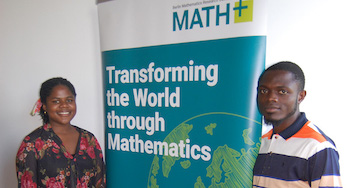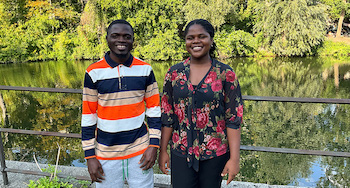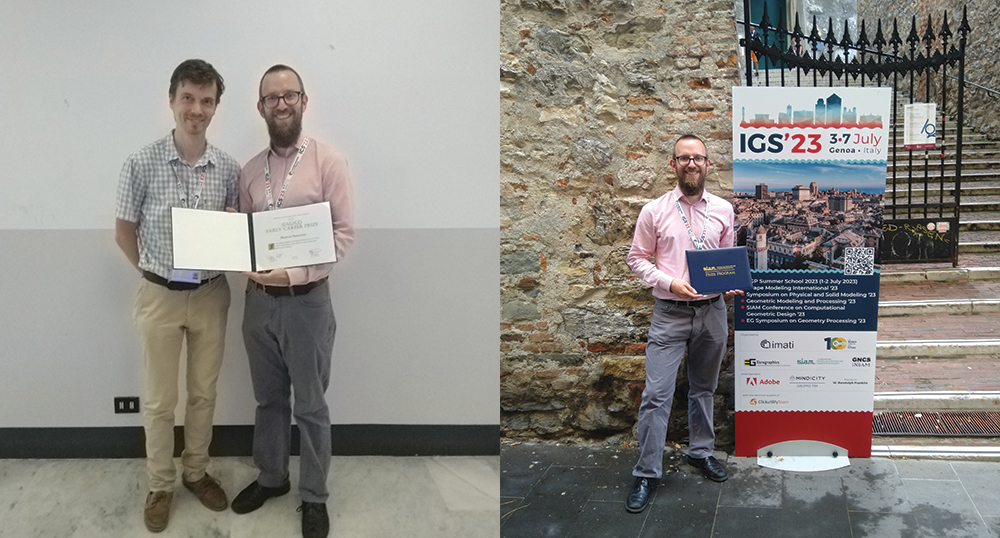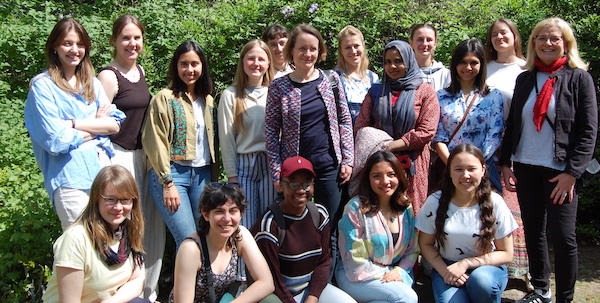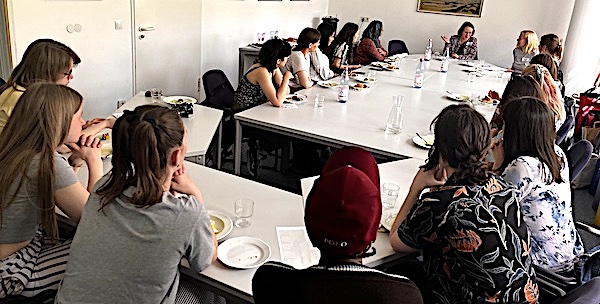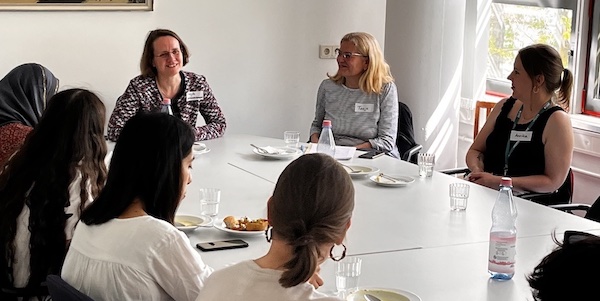
|

Lizaveta from Belarus

Sorelle from Cameroon

Sofía from Colombia

Martha from Uganda

Sophia from the US

Li Li from China

Ángel from Spain

Yoanna from Bulgaria

Abhinav from India

Dragana from Serbia

Alexander from the United Kingdom

Simona from Bulgaria

Efstathia from Greece

Evgenia from Russia
YAM Network Meeting in Münster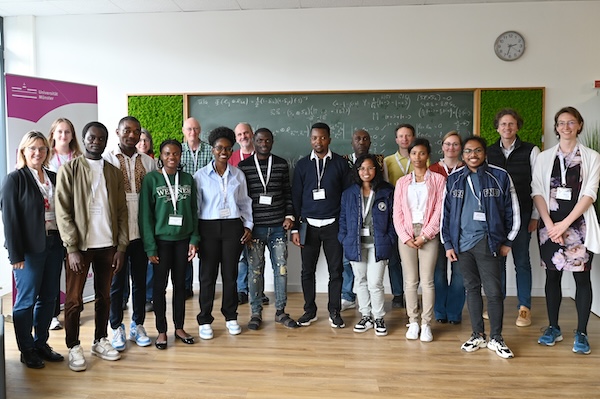 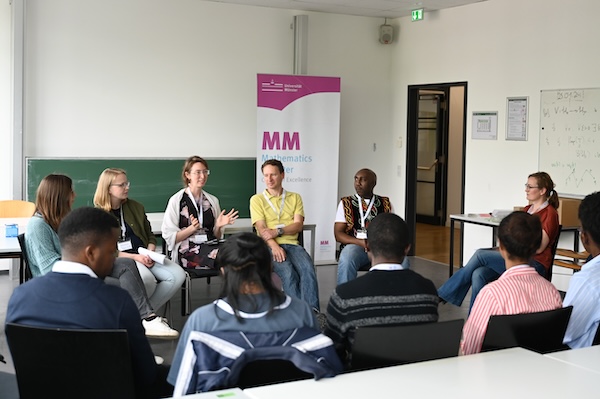 MATH+ YAM Fellow Wilson Tsuata from Berlin attended the network meeting in Münster, accompanied by Hannah Rohwer from the MATH+ office. Unfortunately, the second MATH+ YAM Fellow Samantha Glory Guiate Simo could not participate due to a conference. In September 2023, MATH+ and the BMS welcomed Samantha Glory Guiate Simo and Wilson Tsuata as the first MATH+ YAM Fellows of the Young African Mathematicians (YAM) Fellowship Program for the academic year 2023/24. As YAM fellows, both are also part of the Berlin Mathematical School (BMS) for the duration of the YAM program. 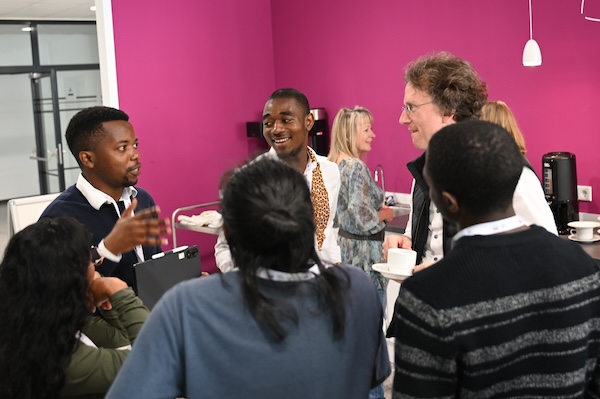 In Münster, the YAM fellows reflected on their experiences and looked ahead after a joint lunch at the Münster Mensa,. They shared their personal and academic learnings from their time in Germany through presentations. A panel discussion followed, featuring Prof. Dr. Franca Hoffmann, initiator of the YAM program, Prof. Dr. Raimar Wulkenhaar, Dr. Fridolin Melong, AIMS-DFG fellow at Mathematics Münster, Prof. Dr. Anna Gusakova, and Dr. Kristina Wensing, who provided tips, advice, and insights into (academic) careers in and outside Germany. The discussion was moderated by Dr. Imke Franzmeier. 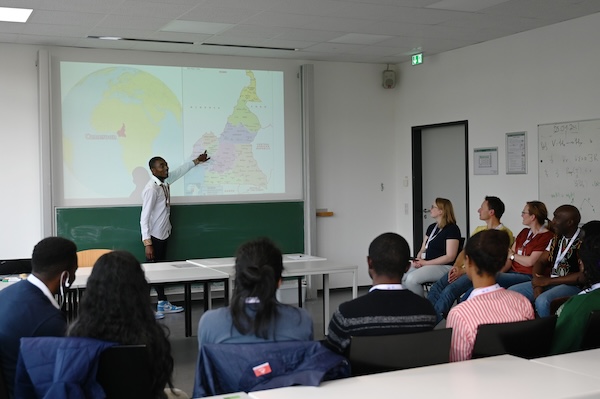 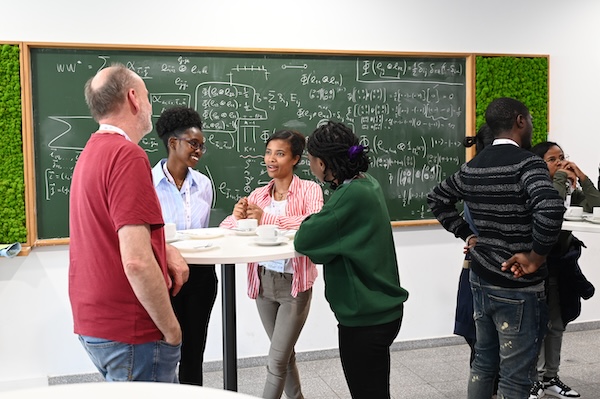 Photos: © Mathematik Münster
After a feedback session, everyone gathered for dinner at "Das Blaue Haus," a well-known student pub in Münster. DFG Approved Two RTG (PhD) Led by MATH+ Scientists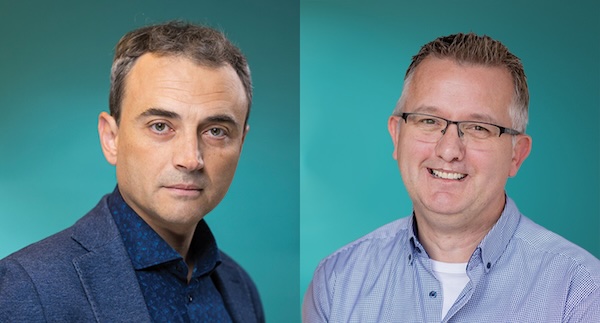 Gavril Farkas (left) © Kay Herschelmann | Peter Bank © Felix Noak The new Research Training Group (RTG 2965) in algebraic geometry “From geometry to numbers: Moduli, Hodge theory, rational points” The new RTG is jointly run by the Leibniz Universität Hannover and the Humboldt-Universität zu Berlin. Stefan Schreieder from Hannover is the spokesperson of the RTG, and Gavril Farkas, Berlin Mathematical School’s co-chair and MATH+ Distinguished Fellow from the Humboldt-Universität zu Berlin, is the co-spokesperson. Apart from Gavril Farkas, the Humboldt-Universität is represented in the RTG with another four PIs, also all MATH+ members, namely Gaetan Borot, Bruno Klingler (also MATH+ Distinguished Fellow), Thomas Krämer, and Angela Ortega. The PhD training in the RTG will run from 01 October 2024 until 30 September 2029, and the DFG will fund 20 PhD positions each for a duration of four years, distributed evenly between the two participating universities. The guiding principle of the RTG is the interplay between geometry and numbers. A first manifestation of this idea is the fact that geometric objects can be assigned algebraic invariants and, in particular, numbers, which often play an important role in classification. Examples are given by Hodge numbers, by intersection numbers on moduli spaces, or by the number of rational points. The research program rests on three main pillars for which the groups in Berlin and Hannover are world experts: • Hodge theory and topology of algebraic varieties; • Geometry and combinatorics of moduli; • Arithmetic of moduli and rational points. The International Research Training Group Berlin-Oxford (IRTG 2544) „Stochastic Analysis in Interaction“ enters its second stage of funding The IRTG is jointly operated by Technische Universität Berlin and the University of Oxford, led by MATH+ member Peter Bank from Berlin and Terry Lyons from Oxford. The further funding means that the successful collaboration between Berlin and Oxford in this mathematical field over the past four and a half years will continue. In particular, it enables PhD students from Berlin and Oxford to visit each other’s institution for months at a time. This IRTG will receive over four million euros in funding from the German Research Foundation (DFG) for another four and a half years. Since April 2020, the PhD students of the international graduate school "Stochastic Analysis in Interaction" have been investigating mathematical questions concerning random systems, as they appear in many models of biology, physics, or finance. "Our graduates from the first phase of funding have, for example, contributed to the mathematical foundations of a better understanding of Bose-Einstein condensation and have also developed numerical methods for dealing with very current models for fluctuations in financial markets," says Peter Bank, who heads the field of financial mathematics at TU Berlin. "But also, at least at first glance, purely mathematical contributions to the integration theory of rough paths have been made and have even been awarded with one of the doctoral prizes of the Excellence Cluster MATH+," he adds. The second funding period will allow the current PhD students, as well as those of a third doctoral group, to complete an equally varied and in-depth training and research program. "We can now follow up on the 14 workshops, the more than 80 lectures given by invited researchers from all over the world, the mini-courses, and the Berlin-Oxford summer schools from the first funding phase with further highlights," says Peter Bank, adding: "And our PhD students will continue to gain international experience. They have already been a flagship of the Berlin research landscape, having held over 200 presentations internationally." (Source IRTG: TU Berlin Press Release, in German) --- Research Training Groups (RTG), funded by the German Research Foundation (DFG) RTG are established by universities to support the development of early career researchers. The groups receive funding from the DFG for a maximum of nine years. Their primary focus lies on the qualification of doctoral researchers within the framework of a focused research program and a structured training framework. Research Training Groups that embrace interdisciplinary collaboration are highly encouraged. The objective is to equip doctoral candidates with the skills to navigate the complexities of the science and academic job markets while fostering their early scientific independence. BMS PhD Student Anastasija Pešić is GAMM JuniorAnastasija Pešić’s research focuses on the Calculus of Variations, specifically in its application to biological membranes. She employs variational techniques, such as Gamma-convergence and scaling laws, to analyze minimizers of nonlocal, nonconvex functionals linked to the formation of lipid rafts in cellular membranes. Her work is driven by a genuine interest in applying analytical techniques to understand complexities within the biological context. 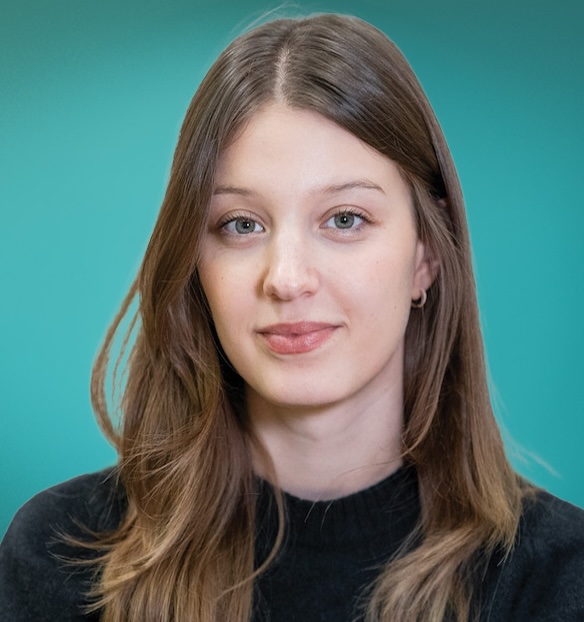 Anastasija Pešić pursued her mathematics studies at the University of Belgrade, Serbia, and continued her studies in Germany as a member of the Berlin Mathematical School (BMS), the Graduate School of MATH+. She completed her M.Sc. at Humboldt-Universität zu Berlin in 2021 with the thesis on “Variational Analysis and Large Deviations Principle for Membrane Models.” In 2021, Anastasija was awarded the Hilda Geiringer Scholarship of the BMS, which aims to support promising female PhD students in mathematical research and recognize outstanding potential. At the DMV Student’s Conference in 2022, she also won the prize for the best conference talk. Currently, Anastasija Pešić is pursuing her Ph.D. at the Humboldt Universität zu Berlin in the Department of Applied Analysis, supervised by MATH+ member Barbara Zwicknagl. Her research project is part of RTG DAEDALUS. Each year, for a duration of three years, up to ten new GAMM Juniors are selected. During their time as GAMM Juniors, the GAMM membership fees are waived. After three years, the membership as GAMM Junior is terminated automatically. By this means, it is guaranteed that young researchers obtain additional financial and emotional support at the start of their academic research, that they transfer their knowledge to the next generations of GAMM Juniors, and that they pass the organization of the group onto them. MATH+/BMS Dirichlet Postdocs 2023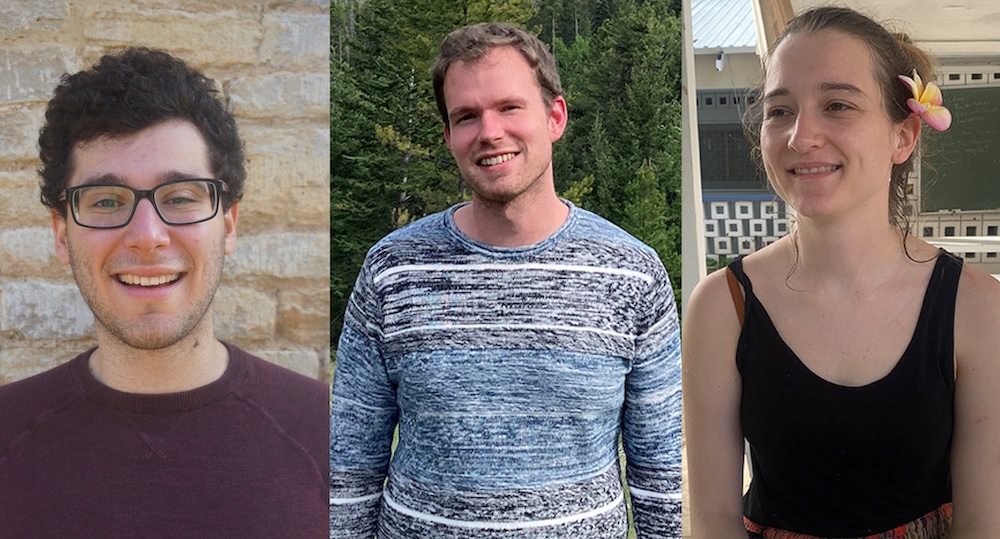 Ioannis Papadopoulos, Fabian Lehman, and Alexandra Wesolek | Photos: private
The Dirichlet Postdoctoral Fellows pursue their research agendas and delve into their individual research interests. MATH+ and the BMS offer an extensive mathematical environment and access to the latest advancements in their respective fields. They will receive support in establishing a collaborative network, encompassing both national and international scientific contacts, and benefit from insights provided by research groups in related or diverse fields. Furthermore, the postdoctoral researchers will have abundant opportunities to acquire teaching, supervisory, and mentoring experience within the framework of the BMS and MATH+. Fabian Lehmann @ HU Berlin: Fabian Lehmann studied mathematics at the Universität Freiburg. He earned his PhD from University College London with a dissertation on “Families of complete non-compact Spin (7) holonomy manifolds” in 2020. In the past three years, he worked at the Simons Center for Geometry and Physics in Stony Brook, New York. His research interests are at the intersection of geometry and partial differential equations. An essential system of partial differential equations appearing in geometry is Einstein’s equations, which characterize spaces with a particularly interesting curvature. They also appear in the theory of general relativity. He studies these equations on octonionic spaces, which have dimension seven or eight and are modeled on the octonions, which form an eight-dimensional number system. This extra structure gives Einstein’s equations a simpler form. Even in this setting, finding solutions is challenging. Fabian hopes that his “research at the BMS can contribute to finding such spaces which look like a cone” and continues with regard to MATH+ and the BMS: “The BMS has been a very successful program so far, and I am honored to be part of it.” Ioannis Papadopoulos @ WIAS: Ioannis Papadopoulos studied mathematics at the Imperial College London (B.Sc.) and the University of Oxford (M.Sc.). He obtained his PhD from the University of Oxford with a thesis on “Computing multiple solutions of topology optimization problems” in 2021. From 2021 to 2023, he held a research associate (postdoc) position at Imperial College London. His main research area is numerical analysis and scientific computing. The research focuses on the interface between PDEs and numerical analysis: spectral and finite element methods for fractional and nonlinear PDEs, nonconvex optimization, preconditioners, and software. During his Dirichlet postdoctoral fellowship, Ioannis wants to explore nonconvex PDE-constrained optimization, sparse hp-finite element methods, and preconditioning techniques for nonlinear PDEs and (quasi) variational inequalities. In particular, he is interested in computing multiple solutions of highly nonlinear problems with sparse high order discretizations. About his upcoming years in Berlin as a Dirichlet postdoc, he said: “It brings me great joy to become a part of the esteemed MATH+/BMS community. I eagerly anticipate engaging in collaborations and embracing what Berlin has to offer.” Alexandra Wesolek @ TU Berlin: Alexandra Wesolek recently completed her PhD at the Simon Fraser University in Vancouver under the guidance of Bojan Mohar. Her primary research focus lies in topological graph theory. This subject is at the intersection of graph theory and topology/geometry. Throughout her graduate studies, Alexandra also went on research visits to France, where she worked on structural graph theory. Prior to joining the BMS, she pursued a 3-month postdoctoral position in Lyon, France, under the mentorship of Nicolas Bousquet and Théo Pierron. During her time at MATH+ and the BMS, she wants to work further on geometric and structural problems in graph theory. A problem she finds particularly engaging is the cops and robber game. In this game, cops try to catch one robber, while the cops and the robber move at the same speed. The game field can either be a graph or a surface. One is generally interested in the minimum number of cops that can catch the robber on the game field. Played on a graph, the game has many connections to structural graph theory since the structure of a graph determines the game. However, when played on surfaces, the game is influenced by the geometry of the surface. Regarding her forthcoming years at the BMS in Berlin, she commented: “Being at the BMS and working in the group of Stefan Felsner was my favorite destination for a postdoc, so I was very excited when I got the Dirichlet Postdoctoral Position. I am looking forward to being part of the BMS and to interacting with the students in the program and other postdocs. I am planning to teach a specialized BMS course in graph theory next year, which I am particularly looking forward to.” BMS/MATH+ Orientation for New Students & Postdocs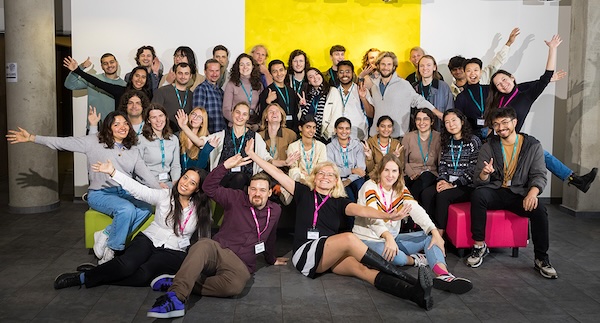 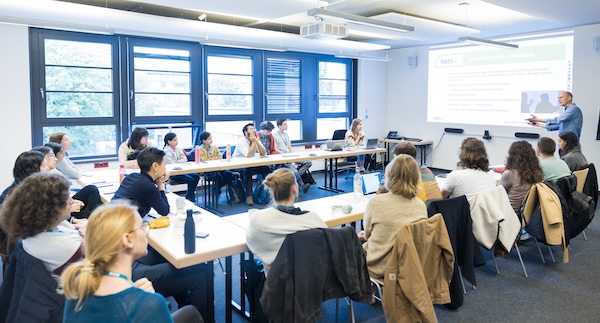 Photos: © Kay Herschelmann / MATH+ On 10 October, we welcomed all new students for the BMS Orientation Day. The BMS Chair, Holger Reich, informed the Phase I students about all relevant aspects of the BMS PhD program, such as Basic and Advanced Courses, the Qualifying Exam, the MATH+ Friday Colloquia, and the BMS Mentoring program. Soft-Skills Seminars were introduced, and funding opportunities for conferences, summer schools, and German language courses explained. The MATH+ Managing Director, Nadja Wisniewski, and our Gender and Diversity Manager, Tanja Fagel, introduced the new Phase II students of the relevant details. The BMS Coordinator, Annika Preuß-Vermeulen, gave a talk on Mental Health and where to find help in case of need for Phase I students in the morning and for the junior researchers (incl. Postdocs and Junior Research Group leaders) in the afternoon. The lunch break brought all newcomers and experienced BMS students and alumni together and gave everyone a chance to get to know each other and share tips in a relaxed atmosphere. For the new Phase I students the day was concluded with presentations of the Basic Courses offered this semester, while the Phase II students and Postdocs heard a talk on Research Data Management by Tim Hasler, MATH+ Chief Data Officer. The Postdoc Orientation in the late afternoon started with a warm welcome by MATH+ Co-Chair, Martin Skutella, who together with the Postdoc Liaison Officer, Theo Roelofs, provided the new researchers with targeted information on opportunities and services at MATH+. This included such pressing topics as career development and its strategies, how to gain teaching experience, and the importance of becoming a mentor as well as finding a mentor for themselves. Funding opportunities and services at MATH+, service information about graduate services at FU, HU and TU and the BUA Postdoc Academy, and instructions on MATh+ publications were also explained. The orientation session ended with introducing the MATH+ Postdoc Representatives at MATH+ who participate in MATH+ Board and BMS Committee meetings. The BMS Orientation week also encompassed many other helpful and also fun activities to prepare the students for studying and living in Germany and Berlin, like an Intercultural Training, a Master Regulations Meeting, and Campus Tours with the Student Representatives. A Walking Tour through Berlin and a food tour organized by the Student Representatives concluded the program. We hope all groups took advantage of the valuable pieces of information and networking opportunity and had a great start at the BMS/MATH+. We look forward to seeing everyone again at the many BMS/MATH+ activities. LINKS: MATH+/BMS Welcomes the First YAM FellowsWe are delighted to introduce Samantha Glory Guiate Simo and Wilson Tsuata as our first MATH+ YAM Fellows of the Young African Mathematicians (YAM) Fellowship Program for the academic year 2023/24. They just arrived and will stay in Berlin until 30 June 2024. As YAM fellows, they are also a part of the Berlin Mathematical School (BMS) for the duration of the YAM program. Congratulations, and welcome to the MATH+/BMS community! — About the YAM Fellowship Program: The Young African Mathematicians (YAM) Fellowship Program is a collaboration between five of the African Institutes for Mathematical Science (AIMS) and four German Clusters of Excellence: Hausdorff Center for Mathematics (Universität Bonn), Münster Mathematics (Universität Münster), STRUCTURES (Universität Heidelberg), and MATH+ (Berlin). The YAM program welcomes talented African students in mathematics to join one of the four clusters for nine months. They can take courses and seminars and gain experience in working on research projects. Call for Applications: Dirichlet Postdoctoral FellowsThe Berlin Mathematics Research Center MATH+ and the Berlin Mathematical School (BMS) invite applications for the Dirichlet Postdoc Fellowship starting in Fall 2024. This two-year position is open to promising young mathematicians who will have completed their PhD degree by 30 September 2024 and want to pursue their own research in one of the eight broad research areas of mathematics covered by the Berlin Mathematical School. The competitive full-time salary includes health insurance. Fellows are expected to teach one semester course per year, typically in English at the graduate level. Applications from well-qualified individuals, especially women, are highly encouraged. Application deadline: 1 December 2023 (23:59:59, Berlin time, UTC +1 hour) MATH+ Dissertation Award 2022 for BMS GraduatesIn cooperation with the Einstein Foundation Berlin, the Berlin Mathematical School (BMS) of the Cluster of Excellence MATH+ awards up to three annual prizes for outstanding dissertations to BMS graduates. We are delighted to announce that the MATH+ Dissertation Award 2022 have been presented to Dr. Luzie Helfmann, Dr. Patrick Morris, and Dr. Yizheng Yuan for their excellent theses. Congratulations! 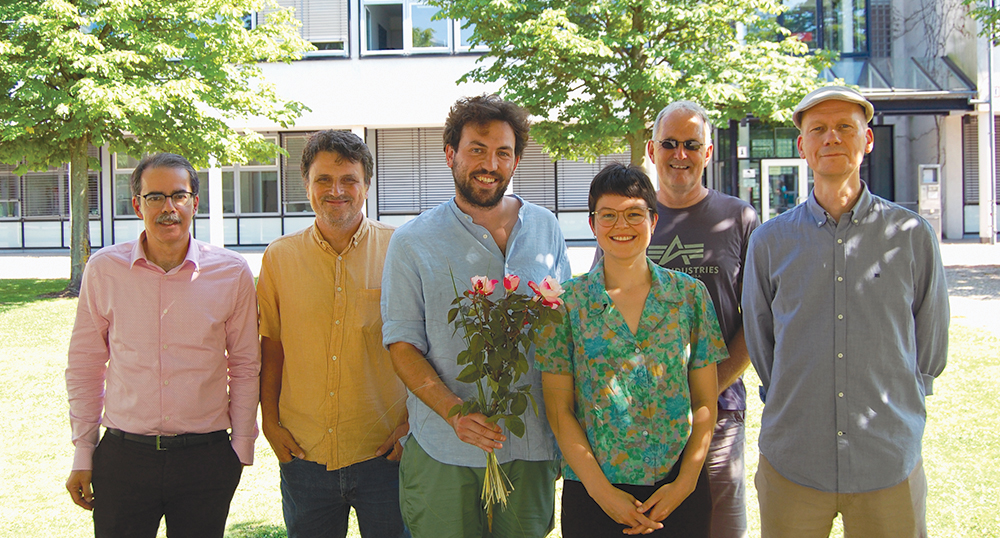 Photo (from left to right): Michael Hintermüller (MATH+ Chair), Tibor Szabó (Advisor P. Morris), Patrick Morris (Awardee), Luzie Helfmann (Awardee), Luzie Helfmann 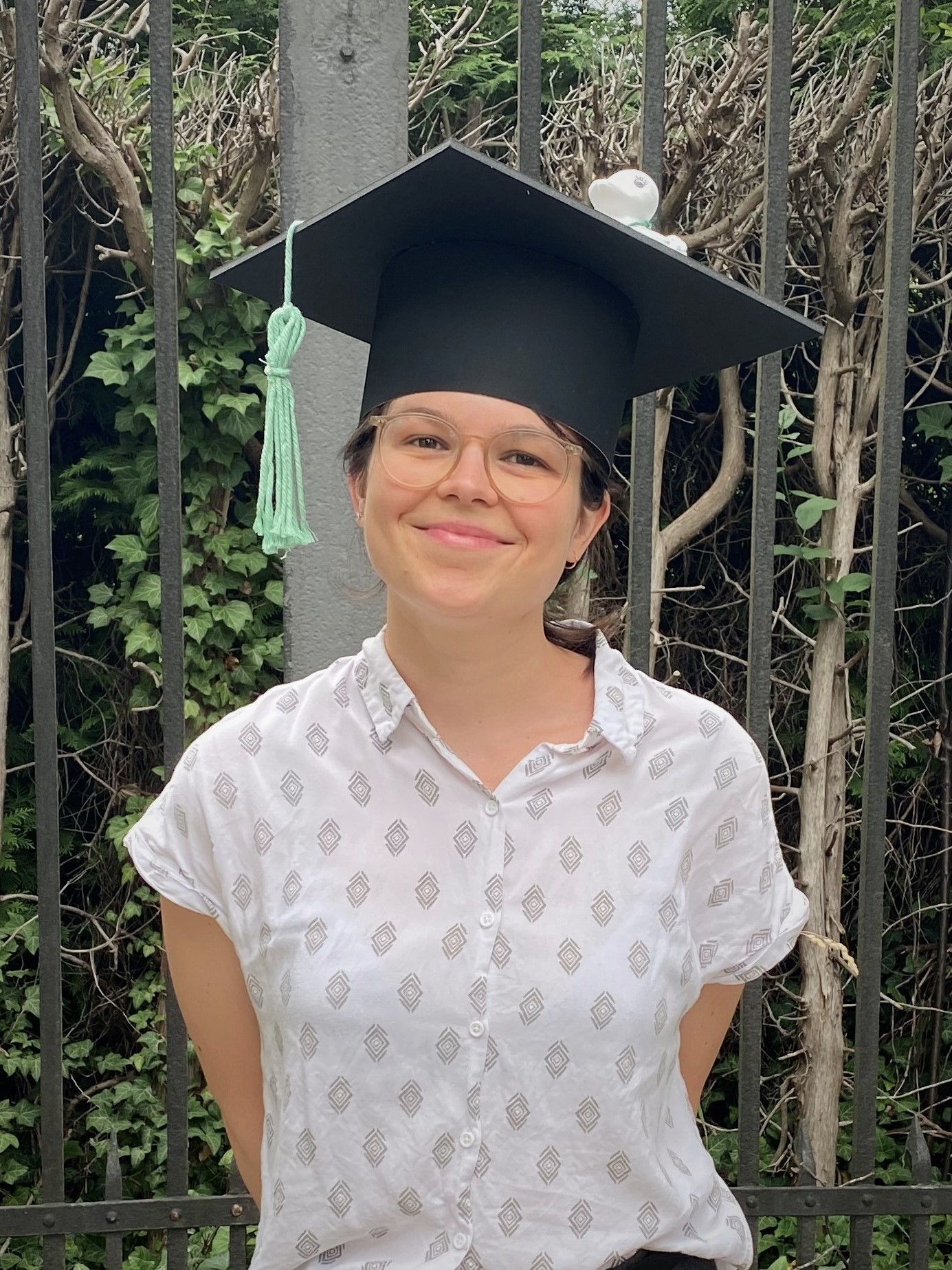
After High School (Abitur), Luzie Helfmann moved from Germany to England to study Mathematics and Physics at the University College London from 2012 to 2016. Upon returning to Berlin, she enrolled at Freie Universität Berlin (FU Berlin) to obtain her Master’s degree in Mathematics, successfully graduating in 2019 with a Master’s thesis on “Stochastic Modeling of Interacting Agent Systems.” She continued her doctoral studies at FU Berlin and the Potsdam Institute of Climate Impact Research under the supervision of Christof Schütte and graduated with a PhD in 2022. Following her doctoral studies, she joined the Zuse Institute Berlin (ZIB) as a postdoctoral researcher, focusing on model reductions of social dynamics. In June 2023, Luzie Helfmann became part of the Climate Policy Team at Climate Analytics, a global institute for climate science and policy. Within her role as a Data Scientist, she contributes to several projects through modeling and software development, including the Climate Action Tracker. Dissertation: “Non-stationary Transition Path Theory with Applications to Tipping and Agent-Based Model
Many complex systems can tip, that is, change from one very stable state to another, possibly with dramatic consequences. Not only the climate system has this tipping potential, but also social systems, such as when public opinions drastically shift or when social movements arise. The dissertation aimed to develop ways to quantify and understand these transition or tipping events in social dynamics modeled with agent-based models. To achieve this, the dissertation builds on an existing theory called Transition Path Theory that allows quantifying transition paths. However, real-world dynamics that exhibit tipping behavior are often time-dependent and can be quite high-dimensional. Therefore, Transition Path Theory was extended to work with time-dependent dynamics, and it was demonstrated how the theory could be combined with model reduction methods to handle large-scale systems.
Patrick Morris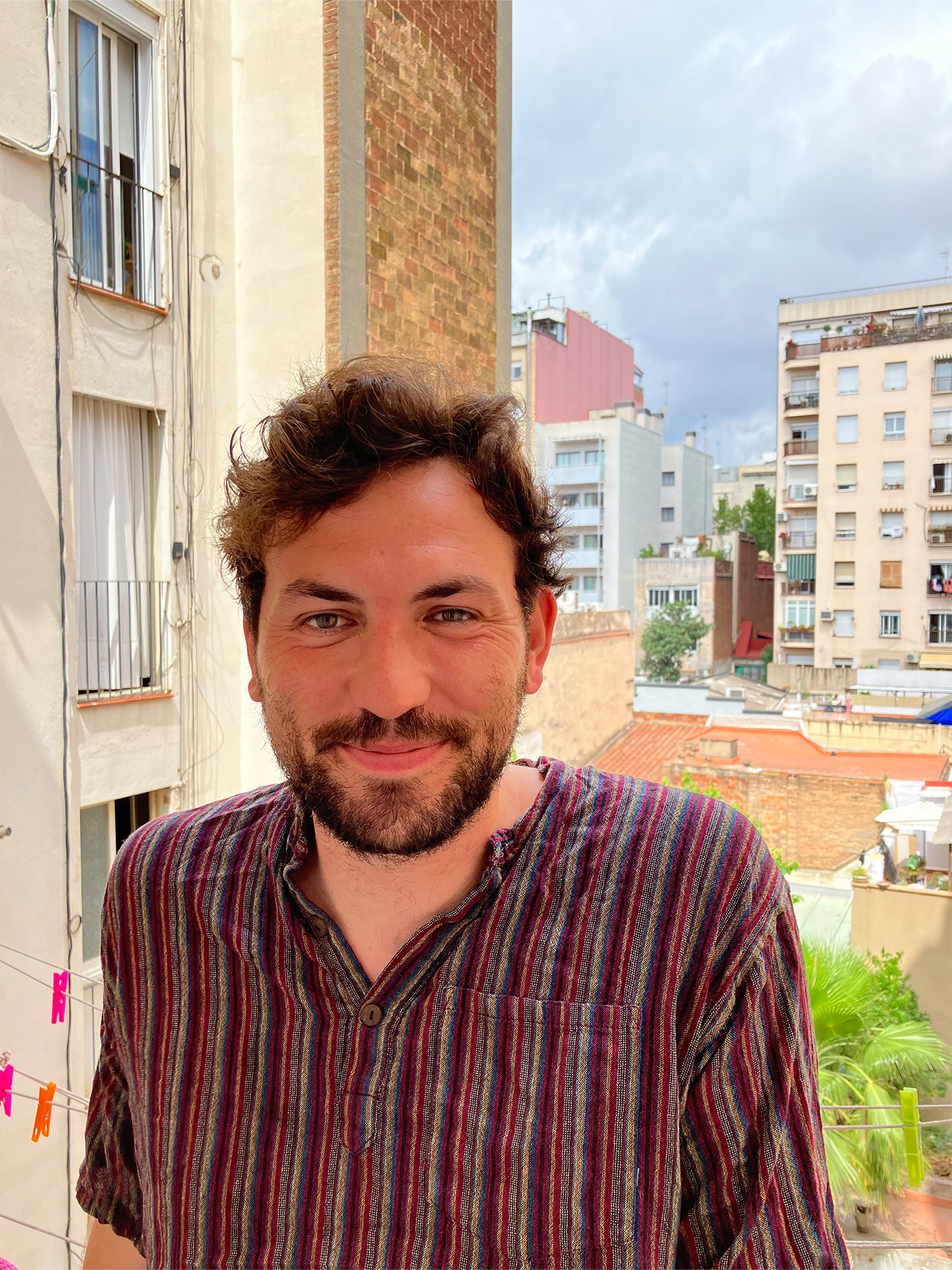
Patrick Morris started his mathematical career in the UK at the University of Bristol with a 4 year Msci in Mathematics (2011-2015) before coming to Berlin, where he graduated with an MSc in Mathematics from FU Berlin in 2017. He then continued his doctoral studies in the same Combinatorics and Graph Theory group of the Mathematics department at the FU Berlin under the supervision of Tibor Szabó and completed his PhD in 2021. Since April 2022, Patrick Morris has been a postdoctoral researcher in the GAPCOMB group at Universitat Politècnica de Catalunya (UPC) in Barcelona, hosted by Guillem Perarnau and funded by a Walter Benjamin Fellowship from the Deutsche Forschungsgemeinschaft (DFG, German Research Foundation). After that, he will receive a Marie Curie grant for the next 2 years. His research interests are extremal and probabilistic combinatorics and design theory. He recently got his main result from his thesis accepted by the Journal of the European Mathematical Society (JEMS). In his spare time, he is a DJ and has a radio show on Radio Banda Larga (RBL) called "Fluid Dynamics."
Dissertation: “Clique Factors: Extremal and Probabilistic Perspectives”
Suppose you are organizing a wedding seating plan, and each table seats exactly x people (e.g., x=10). Is it possible to have a plan with any 2 people on the same table being friends? In mathematical terms, this asks if a certain graph (the friendship network of guests) has a clique factor (the seating plan). This is a hard question, and the answer depends heavily on the network. Intuitively, it should be easier if the guests are well connected, and it has been a major theme in Combinatorics since the 60s to formalize this. This thesis proves that certain pseudorandom conditions (saying the network “looks” random) imply that clique factors exist. For x= 3, these conditions are optimal, and the result confirms a famous conjecture of Krivelevich, Sudakov, and Szabó (thesis advisor) from 2004.
Yizheng Yuan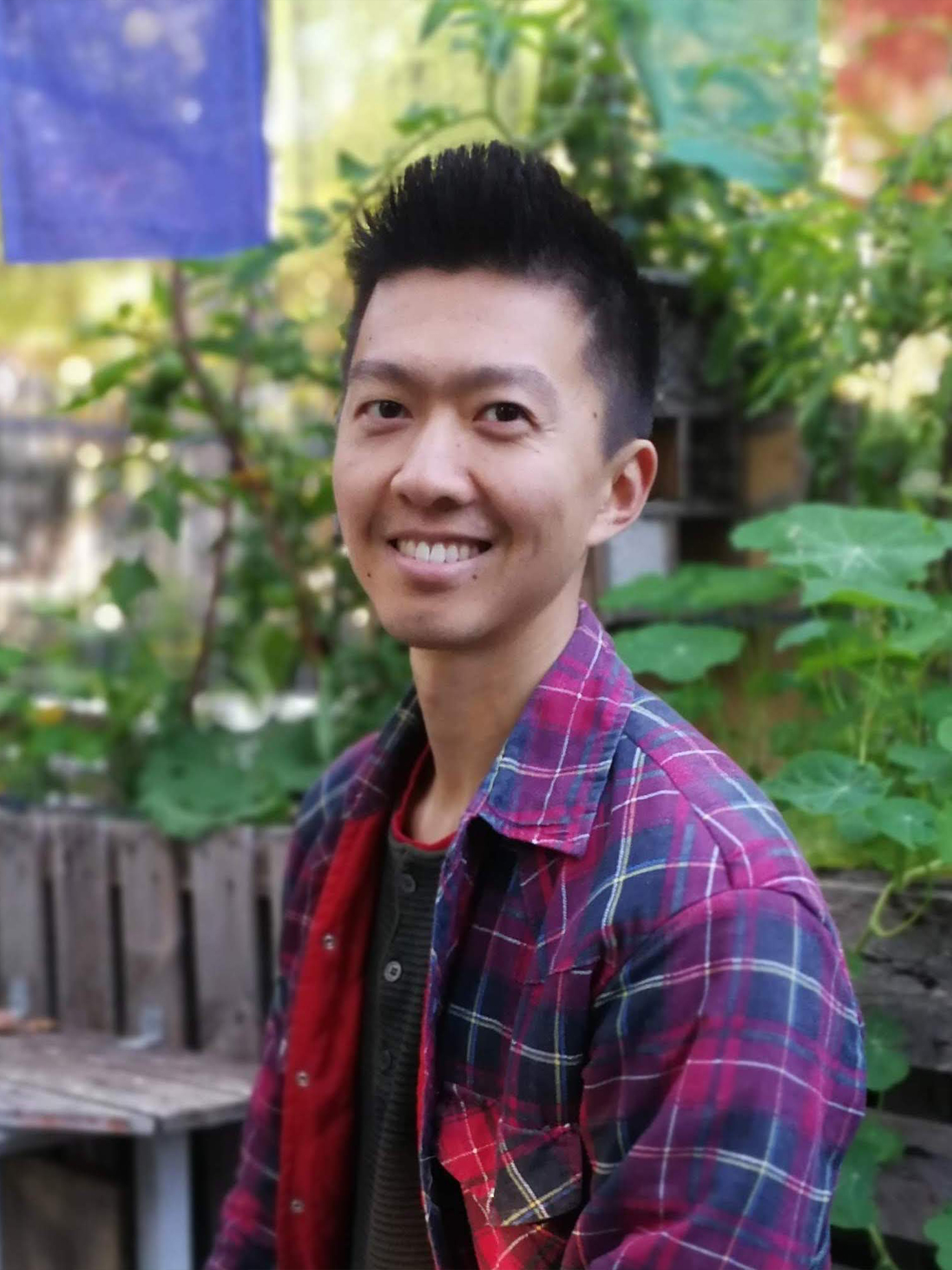
Yizheng Yuan enjoyed getting to know all three math institutes of the major Berlin universities, starting at FU Berlin in Mathematics with a minor in Economics. After graduating from FU Berlin in 2015, he moved to HU Berlin where he became interested in the Schramm-Löwner Evolution (SLE), which was the subject of his Master’s Thesis “Regularity Properties of Schramm-Löwner Evolution.” He was a PhD student at Technische Universität Berlin under the supervision of Peter K. Friz (2018-2022) and joined the BMS and MATH+ in 2020. His commitment to the BMS and the Berlin mathematical landscape has been displayed many times, as a student seminar speaker in the embedded IRTG 2544, as a speaker in the 9th BMS Student Conference, and as pre-speaker to the IRTG lecture of Nina Holden. Since October 2022, he has been a postdoc at the Department of Pure Mathematics and Mathematical Statistics of the University of Cambridge (UK) with Jason Miller (PI). His research focuses on random conformal geometry, in particular Löwner chains, SLE, Gaussian multiplicative chaos, and Liouville Brownian motion.
Dissertation: “Schramm-Loewner Evolution and Path Regularity”
In the early 2000s, only a handful of mathematicians were concerned themselves with a newly constructed and somewhat strange-looking object called Schramm-Loewner evolution (SLE). Today, about twenty years later, SLE is present everywhere in current research in probability, particularly random conformal geometry and statistical physics. It is essentially the unique random curve in the plane that has certain symmetries, and its prominence and ubiquity are somewhat comparable to that of Brownian motion. The dissertation digs into some fundamental questions regarding these random curves, ranging from characterizing in which sense they are “non-self-crossing” to quantifying their regularities.
BMS Alumnus won 2023 SIAG/GD Early Career PrizeBMS Alumnus Martin Skrodzki received the 2023 SIAG/GD Early Career Prize at the 2023 SIAM Conference on Computational Geometric Design (GD23) on 05 July 2023 in Genoa (Italy), which is part of the International Geometry Summit 2023. Congratulations from the BMS and MATH+! The Early Career Prize of the SIAM Activity Group on Geometric Design (SIAG/GD), established in 2018, is awarded to an outstanding early career researcher in the field of geometric design and processing for distinguished contributions to the field in the five calendar years prior to the year of the award.
Martin Skrodzki received his PhD from Freie Universität Berlin (FU Berlin) under the supervision of MATH+ member Konrad Polthier and with the support of the Berlin Mathematical School (BMS). He is currently an assistant professor at TU Delft in the group of Computer Graphics and Visualization. His research on 3D-scanning, point clouds, denoising, and visualization, as well as his novel activities on illustrations of mathematics, are described as exceptional. Commenting on his award, Skrodzki said: “This award is a tangible recognition of the hard work and dedication me and my collaborators have put into this research. It validates our efforts, and we are both humbled and excited about this distinction. It will open up new opportunities, which can help me continuously develop myself as a researcher and further my career.” He studied mathematics and computer science in Dortmund (Germany), Laredo (USA), and Berlin, where he graduated with a Dr. rer. nat. in 2019 from FU Berlin. While doing his PhD, he was also a member of the C05 Project "Computational and structural aspects in multi-scale shape interpolation" of the Collaborative Research Center (SFB) “Discretization in Geometry and Dynamics” SFB Transregio 109, funded by the German Research Foundation (DFG). After obtaining his PhD, he held postdoctoral positions at the Institute for Computational and Experimental Mathematics (ICERM) at Brown University, the RIKEN Institute (Japan), where he was funded by the German Academic Scholarship Foundation (Studienstiftung des deutschen Volkes), and at TU Delft (Netherlands) with support of the Walter-Benjamin-Program of the DFG. Martin Skrodzki’s research interests include the visualization of high-dimensional data, discrete geometry processing as well as interactions between mathematics and art. They are also set between Computer Science and Mathematics. He is concerned about all issues related to point and data sets. This includes the acquisition of point sets via 3D-scanning or higher-dimensional forms of data collection as well as their processing afterwards. Key terms for the latter are denoising, cluster algorithms, and visualization. In regard to visualization, he is interested in illustrations of mathematics in the broadest sense, including, e.g., virtual reality, 3D printing, and computer animations. Please visit the personal homepage of Martin Skrodzki for more information. 30th Kovalevskaya Lunch: Interview with Tanja FagelOn the occasion of the 30th Kovalevskaya Lunch on 12 May, the “International Women in Math Day”, Tanja Fagel, MATH+ Gender & Diversity Manager, gave us interesting insights into the popular tradition of the lunch in an interview. She describes the importance of the event for young female mathematicians, who experience female professors very closely as role models and can ask burning questions in a direct exchange.
The “Kovalevskaya Lunch” is coming up to its 30th anniversary this year, Congratulations! How will you celebrate? Why was this event named after the Russian mathematician Sophia Kovalevskaya (1850-1891)? What was the reason and the goal for introducing this format and the event? Do you have a personal highlight from all of the Kovalevskaya Lunches? Which women mathematicians have fascinated you the most?
How do young BMS/MATH+ women mathematicians respond to the offer? What would you wish for in terms of your work in “Gender & Diversity“? Thank you very much for the interview and the interesting insights and reviews! Beate Rogler |





